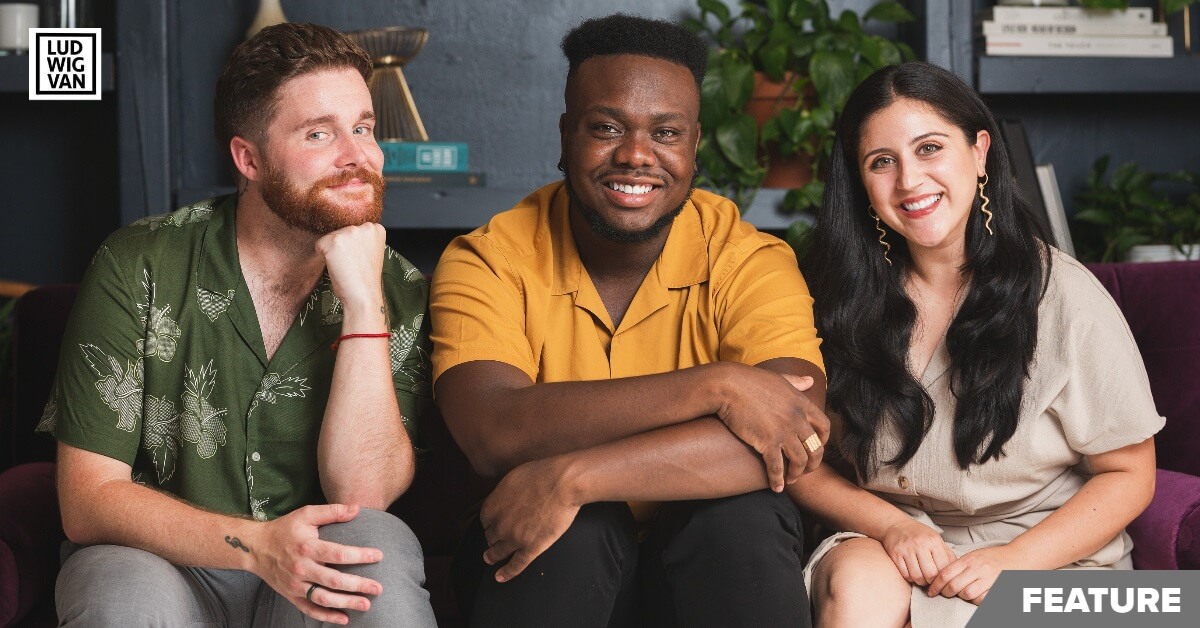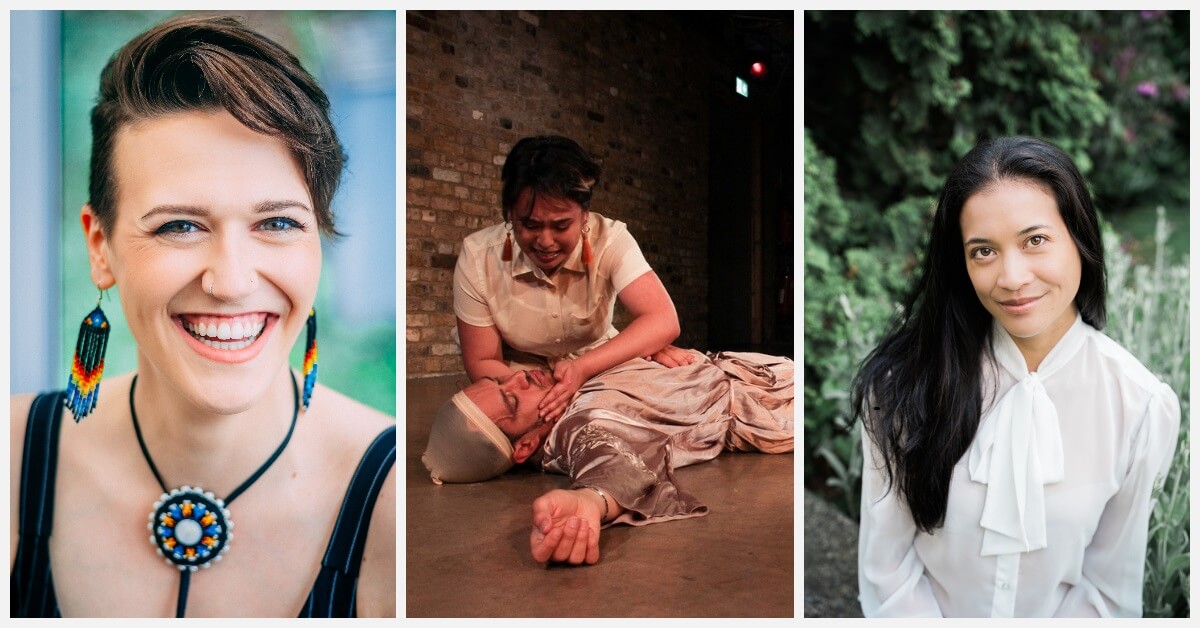Newly founded Opera InReach seeks to inspire newcomers to explore opera through technology and inclusion.

The tsunami of unexpected cancellations and shutdowns thanks to COVID-19 has rendered Toronto’s arts scene to near silence in the last few months. With a future full of uncertainty, many organizations have effectively cleared their table until the arrival of 2021. However, in the midst of such silence can exist moments of curiosity, including the launch of Opera InReach in this unusual time.
Andrew Adridge and Daevyd Pepper, (Co-founders), along with Daniela Agostino and Perri Lo (Directors of Operations) of OIR, are seeking to create something different and new for the audience. The performance arts have always relied heavily on the live aspects — of being there, hearing and feeling the sounds, and taking part in the cultural aspect of a show. However, as time progresses and things change, we have adapted, albeit slowly, into the digital realm, and OIR is aiming to inspire newcomers to explore opera through technology and inclusion, in both group workshop format and personalized exploration.
As a young initiative, OIR is launching with strong connections with many Canadian companies, including the direct partnership of University of Toronto Opera School, and as Company Affiliate with Against the Grain Theatre and Loose TEA Music Theatre, focusing on outreach and teaching artistry. Both long and short sessions will be offered, covering various opera topics. The pre-recorded material will be made later this August over three days, for OIR to create a blended-learning program, mixing both pre-recorded and live material. By incorporating real-time video conferences, where live discussions and activities will take place between the classroom teacher and the students and mentors, it will explore opera through remote-learning.
“Opera roots itself in Eurocentrism. We have transplanted another continent’s cultural object with the expectation that the country and audience should identify with it as it is.”
As outreach artists, OIR seeks to address a few elephants in the current opera world, especially the issue of in/exclusiveness of opera — whether it be cultural or socioeconomic challenge, or as audience, student or performer. Reflecting on the multicultural identity of Canada, the disproportionate focus on opera’s Eurocentrism is an issue, and OIR is hoping to serve everyone in the community, and anyone who may be interested in becoming part of the community.
“Opera roots itself in Eurocentrism. We have transplanted another continent’s cultural object with the expectation that the country and audience should identify with it as it is,” OIR states. However, OIR felt the industry has failed to become inclusive, that the current model has continued “…(a)mplification of Eurocentric, primarily heterosexual, stories and a lack of space for the oppressed and marginalized voices that also make up the Canadian fabric.” One of the ways OIR is attempting to diversify is in the inclusion of BIPOC, indigenous and queer communities, in their mentor list and the communities it wishes to serve.
“We all love opera so much. We believe it has a great power. Opera in the old countries eventually became a part of revolution, with composers and librettists writing for the people,” their literature states. “We don’t believe opera has quite done that here, but it has the opportunity to, and we wish to help nurture that potential.”
The heart of their project is in the mentoring program. Beginning with an application from the potential mentee, the company will assess their interests, and the application will be matched with the best suited mentor — or a mentee could request a particular mentor, if they have a preference. The personalized program will cover any topic relevant to opera, including voice lessons, or developing a playlist of their own, whether it focuses on a particular genre or genres, time period, singers or subjects, and will be left to be curated together through the exploration.
“We all love opera so much. We believe it has a great power. Opera in the old countries eventually became a part of revolution, with composers and librettists writing for the people.”
Rebecca Cuddy joined OIR as a mentor specifically with the hope of creating a better representation for the next operatic generation. With mixed heritage of Métis and European Settler, she is a proud Indigenous woman performer, and she points to her mentors as an integral part of her development as a musician. “My mentors are all of the Indigenous artists who carry themselves with grace and who have led us to safety, understanding and recognition in the arts. It has truly been a group effort over many years, and we are still working,” says Rebecca. Working with Marion Newman, Ian Cusson and Yvette Nolan has given her the chance to ground herself and develop, and she hopes to pass on her experience with as much care and patience as they’ve shown her.

Renee Fajardo joined OIR with a similar mission. Born and raised in the Philippines, Renee considers herself lucky to have the rare good fortune of being able to discover her love of classical music and opera through fully-funded public arts school education. But, with a lack of opportunity to further pursue her interest at home, she left Philippines four years ago — to the Guildhall School of Music and Drama in London, with scholarships and other external support, and then to Toronto, Canada.
Currently studying at the University of Toronto Opera School with a student visa, her life is still peppered with difficulties, especially various bureaucratic red tape. “I cannot audition for the major Young Artist Programs, and would have to pay extra for the programs (where I qualify),” says Renee. Even when she is accepted for international opportunities, the actual logistics of dealing with Visa and Immigration Offices, travel restrictions — these invisible barriers are real and a constant challenge for her. So, getting herself to the actual performances — including a queer re-writing of Don Giovanni, presented by Arcola Queer Collective: Don Jo, for the Grimeborn Opera Festival, and Nathaniel Dett Chorale’s concert performance of Nkeiru Okoye’s Harriet Tubman, is really hard work.
“I said yes, because it’s urgent and necessary work within our obstinate industry.”
When asked about directly-relatable persons in opera, Renee asked back: How many top-tier female Filipino opera singers does anyone know, particularly one who still holds citizenship with the Philippines? “I admire Charles Sy immensely, but he is Canadian, and our privileges are not the same,” says Renee. So when she was asked to join OIR as a mentor, she said yes with conviction. “I said yes, because it’s urgent and necessary work within our obstinate industry. It shouldn’t be this hard to access opera, and everyone who takes part in it deserves to feel like there is no boundary to their belonging in it, and it belonging to them.” OIR’s core mission of outreach, with the specific mandate of representing and sharing, gives Renee hope that, “the community at large may discover more fully that the lack of opera-related experience is not a deterrent to enjoy opera in itself, that opera can, and should look like their own experiences, and can tell the stories that they want, and need to see.”
OIR’s first wave of releases will be here soon, just in time for the end of the long summer. Where will we be, with the pandemic? Where and who would OIR reach, and how could arts continue to evolve at this difficult time? How can we keep exploring the love of performance arts, and where will we be, in a year’s time? No one knows yet, and that makes it an exciting time.
#LUDWIGVAN
Want more updates on classical music and opera news and reviews? Follow us on Facebook, Instagram or Twitter for all the latest.
- CRITIC’S PICKS | Classical Music Events You Absolutely Need To See This Week: April 7 – 13 - April 7, 2025
- SCRUTINY | Les Arts Florissants & Théotime Langlois de Swarte : Passionate, Thoughtful Performance Turns Familiar Vivaldi Into A Revelation - March 31, 2025
- CRITIC’S PICKS | Classical Music Events You Absolutely Need To See This Week: March 31 – April 6 - March 31, 2025



